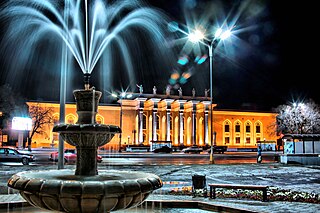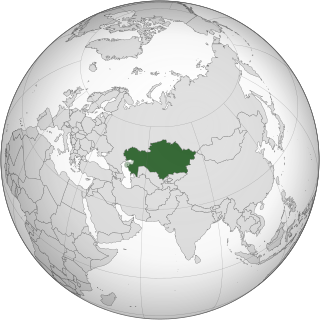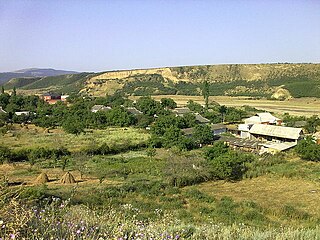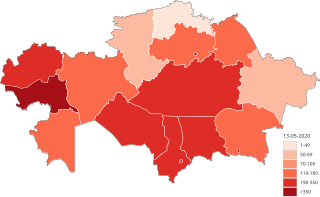Related Research Articles

The Kazakh Soviet Socialist Republic, also known as Soviet Kazakhstan, the Kazakh SSR, or simply Kazakhstan, was one of the transcontinental constituent republics of the Soviet Union (USSR) from 1936 to 1991. Located in northern Central Asia, it was created on 5 December 1936 from the Kazakh ASSR, an autonomous republic of the Russian SFSR.

Karaganda, also known as Qaraghandy or Karagandy, is the capital of Karaganda Region in the Republic of Kazakhstan. It is the fifth most populous city in Kazakhstan, behind Almaty (Alma-Ata), Astana, Shymkent and Aktobe. Population: 497,777 ; 459,778 ; 436,864. Karaganda is approximately 230 km (140 mi) south-east of Kazakhstan's capital Astana.

The Chechens, historically also known as Kisti and Durdzuks, are a Northeast Caucasian ethnic group of the Nakh peoples native to the North Caucasus. They are the largest ethnic group of the North Caucasus and refer to themselves as Nokhchiy. The endonym Nokhchiy is thought to be derived from the name of Prophet Noah and it means 'descendant(s) of Noah'. The vast majority of Chechens are Muslims and live in Chechnya, a republic of Russia.

The Checheno-Ingush Autonomous Soviet Socialist Republic, abbreviated as the Checheno-Ingush ASSR, was an autonomous republic within the Russian Soviet Federative Socialist Republic, in existence from 1936 to 1944 and again from 1957 to 1993. Its capital was Grozny. The 1979 census reported the territory had an area of 19,300 square kilometres (7,500 sq mi) and a population of 1,155,805 : 611,405 Chechens, 134,744 Ingush, and the rest were Russians and other ethnic groups.

North Kazakhstan Region is a region of Kazakhstan, with a population of 539,111. Its capital is Petropavl, with a population of 193,300 people.

Lesbian, gay, bisexual, and transgender people in Kazakhstan face legal challenges not experienced by non-LGBT citizens. Both male and female same-sex sexual activity are legal in Kazakhstan, but same-sex couples and households headed by same-sex couples are not eligible for the same legal protections available to opposite-sex married couples.
The Kirovabad pogrom or the pogrom of Kirovabad was an Azeri-led ethnic cleansing that targeted Armenians living in the city of Kirovabad in Soviet Azerbaijan during November 1988.
Prostitution in Kazakhstan is itself legal, but acts facilitating prostitution, such as operating a brothel or prostitution ring, are illegal. Forced prostitution and prostitution connected to organised crime are prohibited. Prostitution is a serious problem. NGOs reported that criminal prostitution rings often included local law enforcement officials.
The Chechen diaspora is a term used to collectively describe the communities of Chechen people who live outside of Chechnya; this includes Chechens who live in other parts of Russia. There are also significant Chechen populations in other subdivisions of Russia.

The insurgency in the North Caucasus was a low-level armed conflict between Russia and militants associated with the Caucasus Emirate and, from June 2015, the Islamic State, in the North Caucasus. It followed the official end of the decade-long Second Chechen War on 16 April 2009. It attracted volunteers from the MENA region, Western Europe, and Central Asia. The Russian legislation considers the Second Chechen War and the insurgency described in this article as the same "counter-terrorist operations on the territory of the North Caucasus region".

Novolaksky District is an administrative and municipal district (raion), one of the forty-one in the Republic of Dagestan, Russia. It is located in the west of the republic and borders with Khasavyurtovsky District in the northeast, Kazbekovsky District in the southeast, and with the Chechen Republic in the west. The area of the district is 218.2 square kilometers (84.2 sq mi). Its administrative center is the rural locality of Novolakskoye. As of the 2010 Census, the total population of the district was 28,556, with the population of Novolakskoye accounting for 20.8% of that number.

Kazakhstan is a multiethnic country where the indigenous ethnic group, the Kazakhs, comprise the majority of the population. As of 2023, ethnic Kazakhs are about 71% of the population and ethnic Russians in Kazakhstan are about 15%. These are the two dominant ethnic groups in the country with a wide array of other groups represented, including Ukrainians, Uzbeks, Germans, Tatars, Chechens, Ingush, Uyghurs, Koreans, and Meskhetian Turks.

The Chechen–Russian conflict was the centuries-long conflict, often armed, between the Russian, Soviet and Imperial Russian governments and various Chechen forces. The recent phase of the conflict started after the dissolution of the Soviet Union in 1991 and lasted until 2017.
The Chechen-Slav ethnic clashes took place from 1958 to 1965 in North Caucasus, upon ethnic tensions between Slavic settlers and local Chechens and Ingushs. The violence began in 1958, upon a conflict between a Russian sailor and an Ingush youngster over a girl, in which the Russian was fatally injured. The incident quickly deteriorated into mass ethnic riots in Grozny and surroundings, as Slavic mobs attacked Chechens and Ingushs and looted property throughout the region for 4 days. Ethnic clashes continued through 1960s, and in 1965 some 16 clashes were reported, taking tall of 185 severe injuries, 19 of them fatal. By late 1960, the region calmed down and the Chechen-Russian conflict came to its lowest point until the dissolution of the Soviet Union and the eruption of Chechen Wars in 1990.

Batyrkhan Kamaluly Shukenov was a Soviet Kazakhstan and Russian singer, musician, composer, and poet. Shukenov was co-founder and lead singer of the Kazakh-Russian pop music group A-Studio from 1987 until 2000. After leaving the group in 2000, he began his solo career.

The COVID-19 pandemic in Kazakhstan was a part of the worldwide pandemic of coronavirus disease 2019 caused by severe acute respiratory syndrome coronavirus 2. The virus was confirmed to have reached Kazakhstan on 13 March 2020 after two Kazakh citizens in Almaty returned from Germany. That same day, two more cases were confirmed, with one female arriving from Italy in Astana and the other from Germany in Almaty as well. Following the outbreak, on 15 March 2020, President Kassym-Jomart Tokayev declared a state of emergency that was set to last until 15 April 2020. However, measures were prolonged in order to curb the transmission of the virus, leading to many notable holidays such as Nowruz and the Victory Day being cancelled. On 19 March 2020, a strict quarantine was placed on the cities of Astana and Almaty, where the most cases were occurring. On 30 March 2020, Atyrau and five cities in Karaganda Region went under a lockdown.
Anti-Chechen sentiment, Chechenophobia, Anti-Chechenism, or Nokhchophobia, refers to fear, dislike, hostility, and racism towards ethnic Chechens, the Chechen language, or the Chechen culture in general. Anti-Chechen sentiment has been historically strong in Russia, and to some degree has spread to other countries in the former Soviet Union, such as Armenia, to Europe, the Middle East (Syria), and to the United States. For decades, the main causes of hatred against Chechens have been largely due to the created narrative which depicts a violent mentality of Chechens, the association of Chechens with Islamic extremism, and Russian imperialist propaganda targeted at Chechens.
The ethnic conflicts in Kazakhstan refer to a series of insurgencies in Kazakhstan that date back to when the country was part of the Soviet Union, then known as the Kazakh Soviet Socialist Republic. These conflicts have largely been ethnic-based, although in recent years they have decreased in numbers. Some of these conflicts have called for the independence, or the increased autonomy of the group in the country.
The Chechen genocide refers to the mass casualties carried out on the Chechen people during the various stages of the Russia-Chechnya conflict since the second half of the 18th to early 21st centuries. The term has no legal effect, although the European Parliament has recognized the 1944 forced deportation of Chechens, which killed an estimated 1/3-1/2 of the total Chechen population, as an act of genocide. The Ukrainian Rada has also condemned Russia's genocide of the Chechen people.
References
- ↑ "Чеченские погромы в Казахстане 1951 года: что произошло на самом деле" (in Russian). Retrieved 2018-08-26.
- 1 2 "Чеченский погром весны 1951 года в Восточном Казахстане. (свидетельства очевидцев)" . Retrieved 2018-08-26.
- 1 2 "Их топили в Иртыше... Чеченские погромы на севере Казахстана весной 1951 года (страницы истории)" . Retrieved 2018-08-26.